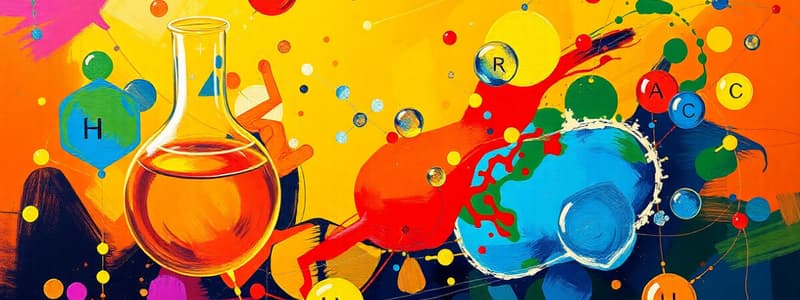Podcast
Questions and Answers
What is formed as a result of a chemical reaction?
What is formed as a result of a chemical reaction?
- Physical changes
- Mixtures of substances
- New substances (correct)
- Energy
A physical change results in new substances being formed.
A physical change results in new substances being formed.
False (B)
Define a molecule.
Define a molecule.
A group of two or more atoms joined together.
A substance that contains atoms of two or more elements is called a ______.
A substance that contains atoms of two or more elements is called a ______.
Match the following terms with their definitions:
Match the following terms with their definitions:
Which of the following is a property of metals?
Which of the following is a property of metals?
Thermal decomposition involves breaking down a compound into simpler substances using mechanical force.
Thermal decomposition involves breaking down a compound into simpler substances using mechanical force.
What is the function of a word equation in chemistry?
What is the function of a word equation in chemistry?
The amount of space an object occupies is known as its ______.
The amount of space an object occupies is known as its ______.
Which term describes a substance that does not conduct electricity?
Which term describes a substance that does not conduct electricity?
Flashcards
Chemical Reaction
Chemical Reaction
A change where one or more new substances are formed.
Physical Change
Physical Change
A change where no new substances are formed - just a change in state.
Reactant
Reactant
A substance that takes part in a chemical reaction.
Product
Product
Signup and view all the flashcards
Boiling Point
Boiling Point
Signup and view all the flashcards
Conductor of Electricity
Conductor of Electricity
Signup and view all the flashcards
Thermal Decomposition
Thermal Decomposition
Signup and view all the flashcards
Volume
Volume
Signup and view all the flashcards
Atom
Atom
Signup and view all the flashcards
Molecule
Molecule
Signup and view all the flashcards
Study Notes
Chemical Reactions
- A chemical reaction is a change where one or more substances are formed.
Evaporation
- Evaporation is when a liquid changes into a gas.
Metals
- A metal is shiny when polished, conducts heat and electricity well, is malleable and flexible, and often has a high melting point.
Mixtures
- Mixtures are two or more substances combined, but not joined together. The substances can often be separated.
Physical Changes
- A physical change is a change where no new substances are formed. Examples include changes in state.
Properties
- A property describes how a material behaves and what it is like. Hardness is an example.
Variables
- A variable is something that can change or be changed in an experiment.
Volume
- Volume is the amount of space something takes up. It's often measured in cubic centimetres (cm³).
Atoms
- An atom is a tiny particle that makes up all substances.
Compounds
- A compound can be split into simpler substances because it contains atoms of two or more elements.
Elements
- An element is a substance made of only one type of atom.
Molecules
- Two or more atoms joined together form a molecule.
Particles
- Particles are the tiny pieces of matter that everything is made of.
Periodic Table
- The periodic table is an organized list of all known elements.
Pure Substances
- A pure substance is a single substance with nothing else mixed in it.
Properties
- A property describes how a material behaves and what it is like.
Boiling Point
- The boiling point is the temperature at which a liquid boils.
Brittle
- A brittle substance breaks easily under force.
Conductor of Electricity
- A conductor allows electricity to pass through it easily.
Conductor of Heat
- A conductor allows heat to pass through it easily.
Ductile
- A ductile material, like metal, can be pulled into a wire without breaking.
Flexible
- A flexible substance can bend without breaking.
Insulator
- An insulator does not allow something to pass through it, such as heat or electricity.
Malleable
- A malleable substance can be beaten or bent into shape without breaking.
Magnetic
- A magnetic material is attracted to a magnet.
Melting Point
- Melting point is the temperature at which a solid turns into a liquid.
Non-metals
- Non-metals are elements that are not shiny, do not conduct heat or electricity well, and are often not flexible.
Ore
- Ore is a type of rock containing enough of a metal to make it worth mining.
Chemical Reactions
- A chemical reaction forms one or more new substances.
Physical Changes
- A physical change produces no new substances; for example, a change in state.
Products
- Products are the new substances formed in a chemical reaction.
Reactants
- Reactants are the substances participating in a chemical reaction.
Thermal Decomposition
- Thermal decomposition is breaking down a compound into simpler substances using heat.
Word Equation
- A word equation shows reactants (on the left) reacting to form products (on the right).
Studying That Suits You
Use AI to generate personalized quizzes and flashcards to suit your learning preferences.




